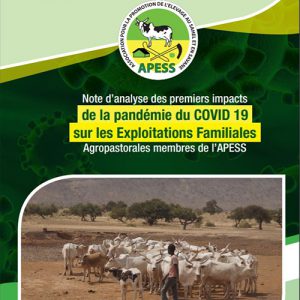The Association for the promotion of livestock farming in the Sahel and the savannah (Apess), a longstanding partner of GRET, has analysed the initial effects of measures taken by States to deal with the Covid-19 crisis.
Based on data collected between March and April 2020 in 12 West and Central African countries (Benin, Burkina Faso, Cameroon, Chad, Gambia, Guinea Bissau, Mali, Mauritania, Niger, Nigeria, Senegal, Chad, Togo), Apess is already observing initial trends pointing to negative impacts on family farms and agropastoral value chain operations. The association fears in particular the effect of an unprecedented crisis on the pastoral livestock sector. The main risks are famines in family farms, an increase in rural conflicts and a long-term interruption of cross-border transhumance.
The brief produced by Apess also presents initiatives already underway and formulated recommendations to attenuate these impacts.
*****
To deal with this unprecedented crisis together, Apess, the Network of West African farmers’ and producers’ organisations (Roppa) and the Billital Maroobé Network (RBM) also set up a committee for monitoring and action among producers’ organisations on the impacts of Covid-19. This committee aims to facilitate mobilisation and commitment of producer organisation networks and civil society to contribute to the application of emergency measures and ensure effective management of the Covid-19 pandemic. It also intends to support implementation of measures and instruments by national services, the above-mentioned networks and development partners with a view to maintaining or restoring the agro-sylvo-pastoral and fishery production capacities of hundreds of thousands of family farms affected by the crises. Lastly, forward-planning reflection has been organised to generate and support the development and implementation of recovery plans by national and regional public institutions.


